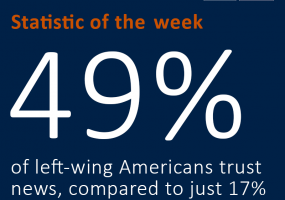Politics, Performance and Rhetoric – the 2010 Prime Ministerial Debates
08 Feb 2011
Rasmus Kleis Nielsen writes:
"The 2010 prime ministerial debates reached parts of the electorate that have been hitherto most excluded from our electoral democracy." This was the central point of Professor Stephen Coleman's presentation on February 7, 2011, when he delivered the inaugural Reuters Institute/BBC David Butler Lecture, organised in honour of Sir David Butler's seminal contributions to the study and popular understanding of media and politics, arguing that the three televised debates during the May general election appealed to many people who rarely follow politics. The whole lecture will be broadcast on BBC Parliament on Saturday February 12 at 9 p.m. and will be made available on the Democracy Live website. Coleman's lecture was based on research conducted with a team of collaborators and published in the new Reuters Institute Challenge "Leaders in the Living Room". His key concern was the systemic implications of the 2010 televised prime ministerial debates on democracy in the UK—the first such the country has seen—rather than the usual questions of who won or lost and whether it all made for good TV. In contrast to those who have decried the debates as trivialising the serious business of running the country, or cast them as an irrelevant relic in an age of non-stop online communications, Professor Coleman made the case for their significant and benign contributions to public life. Based on a careful examination of media coverage of the debates, a series of surveys of the electorate, and analysis of how bloggers wrote about the three performances, Coleman and his co-authors found that much of the pre- and post-debate media coverage focused not only on the "game" but also the substance of politics, that the debates reached a very broad audience—peaking at more than 10 million people watching the first debate on ITV—and that each of the debates generated copious amounts of both on- and offline conversations that kept them alive well beyond their televised 90 minutes. Coleman argued that "first-time voters seem to have formed a special relationship with the televised debates", and were significantly more likely than others surveyed to report that watching the debates had made them more interested in the campaign, that they had learned something from watching them, and that the debates had helped them make up their minds as to who to vote for. In his view, the 2010 prime ministerial debates were "a significant move in the direction of a more deliberative democracy" in the UK, an initiative that should be repeated, expanded, and improved in the future. Appropriately enough, this lecture on debates generated lively debate, superbly moderated by David Dimbleby. Professor Stewart Purvis from City University asked whether Coleman thought there would be more debates to come in future general elections. He responded that he thought there should be and that British politicians risk “serious damage to their reputations” if they try to avoid it. Adam Boulton from Sky News raised the question of whether the debates had any direct impact on the electoral result, and Coleman responded that the debates, in addition to making the Liberal Democrat party leader Nick Clegg known to a wider public, had more of an impact on the overall level of political participation than on the fortunes of any given party. BBC Political Editor Nick Robinson asked if the debates were primarily “special because they were special”, or, as he unfolded his question, whether the significant positive impacts found in 2010 had to do with the fact that this was the first close general election in the UK in years and that the debates were a novelty item. Coleman conceded that research from the US suggests that the wider public can tire of debates if politicians and broadcasters fail to make them relevant, but he cast this as a challenge for those involved more than a necessary outcome, and expressed his hope for even richer forms of interaction in future campaigns.



